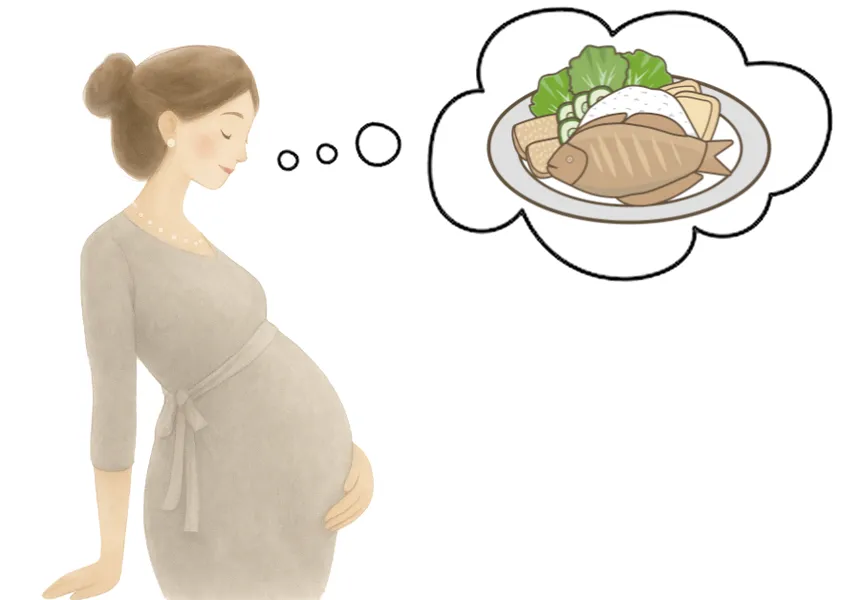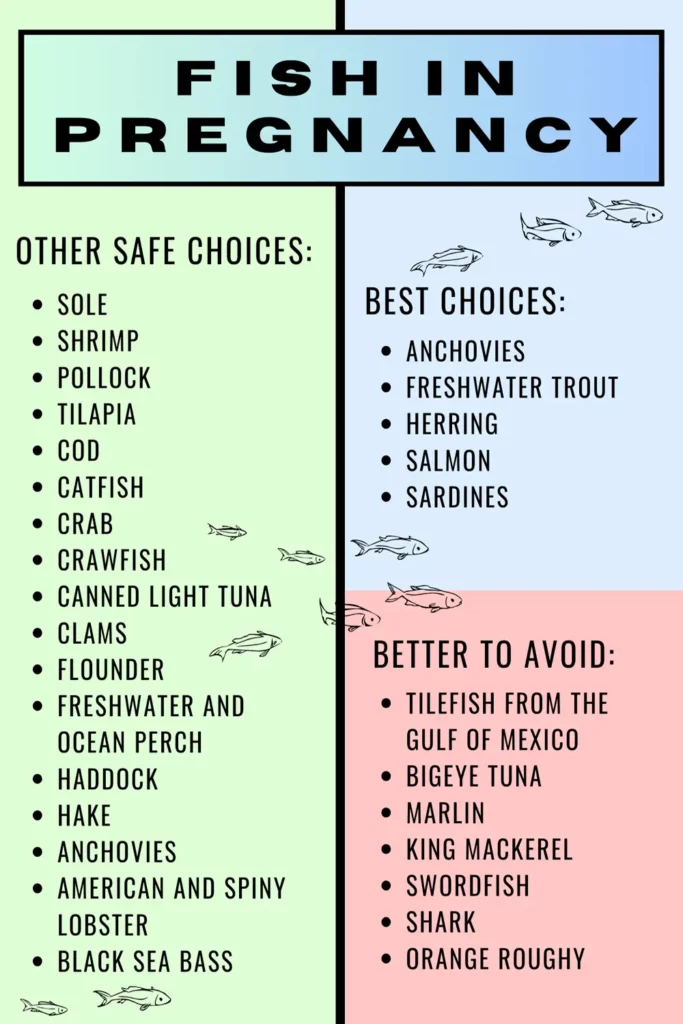Last updated in July 2025
Pregnant and puzzled about seafood? Here’s the simple truth about fish.

If you’re pregnant, chances are you’ve found yourself wondering, “Can I eat this?” — especially when it comes to fish. One minute you hear it’s packed with nutrients that are great for your baby, the next you’re warned about mercury. No wonder it gets confusing!
The truth? Fish can be a smart and safe choice during pregnancy, as long as you know which types to go for and how to prepare them right.
In this guide, I’ll walk you through the fish that are safe to eat, which ones to avoid, how much is okay, and a few simple tips to help you feel confident when fish is on the menu.
Is It Safe to Eat Fish During Pregnancy?
Yes, fish can be a healthy and safe choice during pregnancy! However, it all depends on the type you choose. Not all fish are equally beneficial, and some can even pose risks to human health.
Fish is packed with good stuff like omega-3 fatty acids, protein, iron, vitamin D, and vitamin B12, all of which play a big role in helping your baby grow strong and healthy.
However, certain types of fish contain high levels of mercury, which can be harmful to your baby’s developing brain and nervous system. While all fish and shellfish contain small amounts of mercury, this generally isn’t a health concern.
Bigger fish usually have a lot more mercury in them — and here’s why: they live longer, which gives mercury more time to build up in their bodies. Plus, since they eat smaller fish (who already have some mercury), it just keeps adding up.
What Fish Should You Avoid During Pregnancy?
To reduce mercury exposure and protect your baby, it’s best to avoid large, predatory fish. According to the FDA, pregnant women and young children should steer clear of:
- Shark
- Swordfish
- King mackerel
- Tilefish from the Gulf of Mexico
- Marlin
- Bigeye tuna
- Orange roughy
Safe Fish to Eat While Pregnant (Low in Mercury)
You still have plenty of safe and delicious options! Here are fish and shellfish you can eat safely in pregnancy:
Best Choices (Eat 2–3 servings per week):
- Salmon
- Anchovies
- Sardines
- Freshwater trout
- Herring
📌 Tip: These are omega-3 powerhouses and low in mercury. Win-win!
Other Good Options:
- Shrimp
- Pollock
- Cod
- Catfish
- Tilapia
- Canned light tuna*
- Sole
- Flounder
- Clams
- Crab
- Crawfish
- Haddock
- Hake
- Ocean and freshwater perch
- Black sea bass
- Lobster (American or spiny)
*Limit canned light tuna to no more than 2 servings per week. Avoid albacore (white) tuna, which has more mercury.
💡 Choosing low-mercury fish is important, but just as crucial is making sure it’s prepared and cooked properly.
Why Raw Fish Isn’t Safe During Pregnancy
Raw or undercooked fish can carry harmful bacteria and parasites, like Listeria or Anisakis, that can cause foodborne illnesses such as listeriosis or anisakiasis. These infections may lead to serious complications during pregnancy.
In fact, according to the FDA, pregnant women are about 10 times more likely to get listeriosis than the general population. (source FDA)
To stay safe, all fish should be cooked to an internal temperature of 145°F (63°C). Properly cooked fish will appear opaque and flake easily with a fork.
So, mama, skip the raw stuff for now. This includes sushi, sashimi, carpaccio, tartare, or ceviche!
📌 Note: While freezing fish can kill parasites, it doesn’t eliminate all harmful bacteria. Cooking is the safest route during pregnancy.
How to Prepare Fish Safely
1. Cook it thoroughly
Fish should always be cooked to an internal temperature of 145°F (63°C). It’s done when it turns opaque and flakes easily with a fork.
👉 Quick tips to achieve this temperature:
- Bake or roast at 350°F (175°C) for 15–20 minutes.
- Grill or broil for about 4–5 minutes per side (depending on thickness).
- Pan-fry over medium heat for 3–4 minutes per side.
- Steam for 10–15 minutes, depending on the fillet size.
2. Store fish properly
Refrigerate it within 2 hours of purchase (or 1 hour if it’s hot outside). If you’re not using it within 1–2 days, freeze it. Keep raw fish separate from cooked or ready-to-eat foods.
3. Avoid cross-contamination
Wash your hands, utensils, cutting boards, and countertops thoroughly after handling raw fish.
4. Buy from trusted sources
Whether fresh or frozen, choose fish from reputable sellers. If it smells “off,” skip it. Pregnancy is not the time to take chances.
Why Fish Matters in Pregnancy
Here’s why including fish in your pregnancy diet is such a smart choice:
- Omega-3 fatty acids (DHA and EPA): Crucial for fetal brain and eye development
- Protein: Helps build cells and tissues, and supports healthy growth
- Iron: Helps prevent anemia and supports placenta and fetal development
- Vitamin D & B12: Supports bone health, mood regulation, and energy levels
These nutrients are especially important during pregnancy, and fish provide them in a natural, easily digestible form.
How Much Fish Can You Eat While Pregnant?
According to the FDA and EPA, pregnant women should eat 2–3 servings of low-mercury fish per week, which is about 8–12 ounces total.
- One serving = 4 ounces (about the size of your palm)
- Space out your servings through the week to keep things balanced.
FAQ: Fish and Pregnancy

Final Thoughts about Fish in Pregnancy
Let’s be real — navigating all the “do this, don’t eat that” advice during pregnancy can feel like a full-time job. But when it comes to fish, it doesn’t have to be stressful.
With a little know-how and some smart choices, fish can be a seriously nourishing part of your pregnancy meals. The right types can help your baby’s brain and nervous system develop, give your body a boost, and even lift your spirits (thanks, omega-3s!).
Just stick with low-mercury options, make sure it’s fully cooked, and enjoy without worry.
You’re doing amazing, mama. One bite at a time.
Disclaimer: This article is for informational purposes only and does not substitute professional medical advice. Always talk to your doctor, OB-GYN, or midwife about your individual health needs before making dietary changes during pregnancy.
